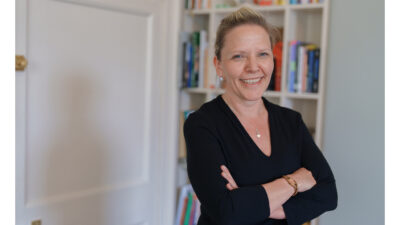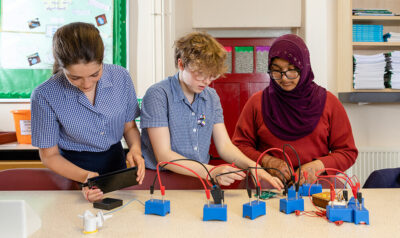Latest

Why Girls' Schools Matter in the 21 Century

Article by Mrs Carol Chandler-Thompson, Head

Carol Chandler-Thompson, Head of St George's School, Edinburgh, shares a powerful perspective on the importance of girls' schools in our evolving society. This article was recently featured in The Scotsman, (2 November 2024) as an Opinion Piece.
The Reputation of British Schools
British schools have enjoyed a great reputation, and this can be seen in the growing appetite for a British-style education overseas; there is a huge breadth of choice and expertise available. State, independent, faith-based, secular, co-educational or single -sex, parental choice has created healthy competition between schools, and it breeds innovation and collaboration, which benefits students and their families.
The Single-Sex vs. Co-Education Debate
So often, arguments for single-sex education are framed in the context of single-sex vs co-education, as if one is superior to the other. I believe this is reductive as there are pros and cons to each, and children are individuals who will have vastly different needs in their formative years. But it is this, the individuality of a child’s particular needs, that is key.
The Relevance of Girls’ Schools in the Twenty-First Century
When specifically thinking about the relevance and importance of girls’ schools for the twenty-first century, as well as looking at it in context of the needs of each child, it is important to consider the world into which young women will enter when leaving school. Gender inequality and stereotypes still exist for women, despite significant strides forward, and single sex schools can have huge benefits for girls in a world that is not always balanced for them.
Gender Challenges in the Modern World
In many ways, there has never been a more exciting time to be a young girl or woman in our society which is striving to be gender blind. However, it is still far from gender equal.
The gender pay gap persists; since 2018 when companies were required to publish gender pay inequalities, BBC analysis showed more than three-quarters of UK companies pay men more, on average, than women. The covid pandemic led to a ‘she-cession’, as women’s recent advances were pulled back and they shouldered the majority of the unpaid and paid caring roles in the household and the economy.
Creating a Learning Environment Free from Gender Stereotypes
Single sex schools can offer a learning environment designed especially for the needs and preferences of girls, free from gender stereotyping and with exposure to numerous inspiring strong female role-models.
Recent UK research revealed girls, and young women are encountering gender stereotypes in all areas of their lives - online, on TV, in films, in newspapers, and from their peers, parents and teachers. This casual and sometimes outright stereotyping causes them to change their behaviour. Many girls experience pressure to be or act a certain way. If the positive images and role-models young girls see are female from a young age, this has an exceptionally powerfully effect on their thinking.
Academic Success and STEM Education

Girls do better in science, technology, engineering and mathematics subjects at all-girls schools. It is well-documented that girls tend to do better academically in all-girls schools, and this is particularly the case in traditionally male-dominated STEM subjects. As well as producing excellent results, there is persuasive evidence that girls who attended girls’ schools are more positive and confident about their abilities in maths, computing, and sciences
This does not mean that all girls’ schools position sciences or maths as better or more important than languages, humanities, or the arts, but they do recognise that women are under-represented in these areas, and they do not believe in boys’ or girls’ subjects – every subject is a girls’ subject.
Opportunities for Leadership and Growth
There is a myriad of other ways that girls’ schools embed an empowering ‘yes’ mindset. In all-girl environments, there are twice as many opportunities for girls - in leadership, drama, sports, music, public-speaking and more. Girls from as young as three, learn to be leaders. Every leadership position is held by a girl. It is guaranteed that a girl will be the head student, the sports captain and the captain of the debate team. Girls learn to find their voice and speak up.
Sports and Co-Curricular Activities

Single sex girls’ schools place a premium upon providing sporting and co-curricular opportunities. Many invest as much time in traditional boys’ sports, such as cricket, as they do in traditional girls’ sports, such as netball. Girls’ schools have a culture where everyone is active and competitive in sport. Girls are mentored, trained, and coached by a female-dominated team of PE staff who act as positive role models.
Co-curricular activities deliberately help girls get out of their comfort zone in the company of their friends, with chances to be adventurous and self-sufficient.
Building Confidence and Assurance
All this helps develop a healthy self-confidence and assurance that stays with them as they become women. Given that recent attitude surveys demonstrate lack of confidence is a key factor holding women back, the importance of this is self-evident.
Fostering a Strong Voice for Girls
Single sex schools create environments where girls’ voices are prized. Evidence shows girls get less attention than boys in a mixed environment, in a girls’ school, a positive risk-taking approach is nurtured and encouraged. Rather than taking on a supporting or moderating role in discussion, girls learn from an early age to make mistakes, ask a question without fear of looking daft and to disagree respectfully and assertively with others. Having the chance to build resilience and test oneself out from a young age, means these neural pathways are strongly engrained by the time girls attend university and move into the world of work.
The Case for Girls’ Schools
If we want our daughters to know their own minds, follow their passions (not the crowd) and be able to articulate their views; a girls-only school is a great environment in which to hone those attitudes and qualities. It is my sincere hope that, in a drive to standardise or consolidate schools, we do not lose the variety, choice and specialisation of our admired education offering that so enables our young people, our young women to thrive.
To find out more about a St George's education, contact our admissions department.

